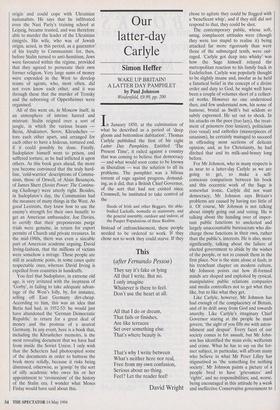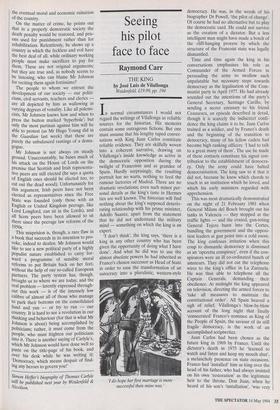Our latter-day Carlyle
Simon Heifer
WAKE UP BRITAIN! A LATIER DAY PAMPHLET by Paul Johnson Weidenfeld, £9.99, pp. 200 In January 1850, at the culmination of what he described as a period of 'deep gloom and bottomless dubitation', Thomas Carlyle published the first of his eight Latter Day Pamphlets. Entitled 'The Present Time', it railed against a country that was coming to believe that democracy — and what would soon come to be known as liberalism — was the solution to all its problems. The pamphlet was a bilious torrent of rage against progress, demand- ing, as it did, that a British Chief Governor, of the sort that had not existed since Cromwell, be instituted to take control of the
floods of Irish and other Beggars, the able- bodied Lackalls, nomadic or stationary, and the general assembly, outdoor and indoor, of the Pauper Populations of these Realms.
Instead of enfranchisement, these people needed to be ordered to work. If they chose not to work they could starve. If they chose to agitate they could be flogged with a 'beneficent whip', and if they still did not respond to that, they could be shot.
The contemporary public, whose soft, smug, complacent attitudes were (though they were too stupid to realise it) being attacked far more rigorously than were those of the submerged tenth, were out- raged. 'Carlyle got deep into whisky' was how the Sage himself relayed the metropolitan reaction to his family back in Ecclefechan. Carlyle was popularly thought to be slightly insane and, insofar as he held a fanatical belief in the concept of a divine order and duty to God, he might well have been a couple of volumes short of a collect- ed works. However no one understood then, and few understand now, his sense of humour, brutal as Swift's but seldom so subtly expressed. He set out to shock. In his attacks on the poor (too lazy), the treat- ment of prisoners (too lenient), politicians (too venal) and catholics (masterpieces of satanism), he certainly managed to succeed in offending most sections of delicate opinion; and, as for Christianity, he had ditched that and its milk-and-honey long before.
For Mr Johnson, who in many respects is as near to a latter-day Carlyle as we are going to get, to make a self- conscious comparison between his book and this eccentric work of the Sage is somewhat ironic. Carlyle did not want democracy; Mr Johnson says Britain's problems are caused by having too little of it. Of course, Mr Johnson is not talking about simply going out and voting. He is talking about the handing over of impor- tant public functions to unelected and largely unaccountable bureaucrats who dis- charge those functions in their own, rather than the public's, interests. He is also, more significantly, talking about the failure of elected government to abide by the wishes of the people, or not to consult them in the first place. Nor is the state alone at fault; in his trenchant chapter on modern culture, Mr Johnson points out how ill-formed minds are shaped and exploited by cynical, manipulative public relations companies and media controllers not to get what they like, but to like what they get.
Like Carlyle, however, Mr Johnson has had enough of the complacency of Britain, and of its drift away from God and towards anarchy. Like Carlyle's imaginary Chief Governor staring at the people he must govern, 'the sight of you fills me with aston- ishment and despair'. Every facet of our society comes in for assault, but Mr John- son has identified the main evils; welfarism and crime. What he has to say on the for- mer subject, in particular, will affront many who believe in what Mr Peter Lilley has stigmatised as 'the something for nothing society'. Mr Johnson paints a picture of a people bred to have 'grievances' and `rights', and no responsibilities; and, worse, being encouraged in this attitude by a weak and ineffective Conservative government to the eventual moral and economic ruination of the country.
On the matter of crime, he points out that in a properly democratic society the death penalty would be restored, and pris- ons used for punishment rather than for rehabilitation. Relentlessly, he shows up a country in which the feckless and evil have the best deal of all, while ordinary working people must make sacrifices to pay for them. These are not original arguments; but they are true and, as nobody seems to be listening, who can blame Mr Johnson for reciting them again fortissimo?
The people to whom we entrust the development of our society — our politi- cians, civil servants, teachers and clerics are all depicted by him as wallowing in varying degrees of venality. Like all polemi- cists, Mr Johnson knows how and when to press the button marked 'hyperbole'; but only the most partisan against him will be able to protest (as Mr Hugo Young did in the Guardian last week) that these are purely the unbalanced rantings of a dema- gogue.
Mr Johnson is not always on steady ground. Unaccountably, he bases much of his attack on the House of Lords on the premise that Scottish and Irish representa- tive peers are still elected (he says a quota of English ones should be elected too, to cut out the dead wood). Unfortunately for this argument, Irish peers have not been elected as representatives since the Free State was founded (only those with an English or United Kingdom peerage, like Lord Longford, can sit in the Lords), and all Scots peers have been allowed to sit there since the peerage law reforms of the 1950s.
This misprision is, though, a rare flaw in a book that succeeds in its intention to pro- voke, indeed to deafen. Mr Johnson would like to see a new political party of a highly populist nature established to carry for- ward a programme of sensible moral reforms to put Britain back on her feet, without the help of our so-called European partners. The party system has, though, brought us to where we are today, and the real problem — latently expressed through- out this work — is of the intensely low calibre of almost all of those who manage to park their bottoms on the consolidated fund and run — or try to run — our country. It is hard to see a revolution in our thinking and behaviour (for that is what Mr Johnson is about) being accomplished by politicians; rather, it must come from the people, who must frighten our politicians into it. There is another saying of Carlyle's, which Mr Johnson would have done well to paste on the title-page of his book, and over his desk while he was writing it: Democracy, which means despair of find- ing any heroes to govern you!'
Simon Heffer's biography of Thomas Carlyle will be published next year by. Weidenfeld & Nicolson.



























































 Previous page
Previous page